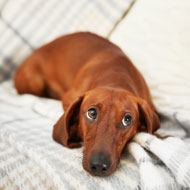Michael Gove ‘actively reviewing’ animal cruelty penalties

Environment secretary Michael Gove has said he is ‘actively reviewing’ current penalties for animal cruelty.
Environment secretary Michael Gove has said he is ‘actively reviewing’ current penalties for animal cruelty and could be toughening up punishments for the worst offenders.
According to the website Politics Home, Mr Gove made the pledge during departmental questions yesterday morning (20 July).
Responding to a question from conservative MP Philip Davies, he said: "It’s something I’m actively reviewing.
“As the Honourable Gentleman knows, I’m not someone who will automatically reach for stronger criminal sanctions as the only route to dealing with a problem, but there are particular cases of animal cruelty where we may well need to revisit the existing criminal sanctions to ensure the very worst behaviour is dealt with within the full force of the law.”
The move has been welcomed by animal welfare campaigners, who have long fought for tougher sentencing for animal abusers.
Chris Pitt, deputy director of Campaigns for the League Against Cruel Sports said: "We are pleased to hear Michael Gove recognises that current maximum sentences for animal cruelty offences are inadequate and need reviewing. Dog fighting, one of the most brutal and heinous forms of animal abuse, shockingly only carries a maximum six-month prison sentence, and yet if found guilty of fly tipping, individuals can face up to five years in prison.
“Current sentences have remained unchanged for over a hundred years and therefore fail to reflect the horrific cruelty inflicted on animals in the name of barbaric ‘sports’ such as dog fighting.”
The RSPCA also welcomed the announcement, adding that there is a huge strength of feeling behind a move to toughen up theses sentences.
“Our most recent figures show that there are over 30 animal cases where the maximum prison sentence was given under the present law and in some cases, the magistrates expressed frustration that they could not give a higher sentence. Many of these are for the most serious crimes including animal fighting and deliberate cruelty,” the RSPCA said in a statement.
“We were disappointed the previous Government chose to ignore the Select Committee recommendation to increase the maximum sentence for animal cruelty offences to five years imprisonment. This move would have brought our sentences in line with Northern Ireland.
“As suggested by Mr Gove in the House of Commons this morning, we hope that the Government will revisit this issue and look at bringing in longer jail sentences for the most serious cases of animal abuse and neglect."



 The Veterinary Medicines Directorate (VMD) is inviting applications from veterinary students to attend a one-week extramural studies (EMS) placement in July 2026.
The Veterinary Medicines Directorate (VMD) is inviting applications from veterinary students to attend a one-week extramural studies (EMS) placement in July 2026.